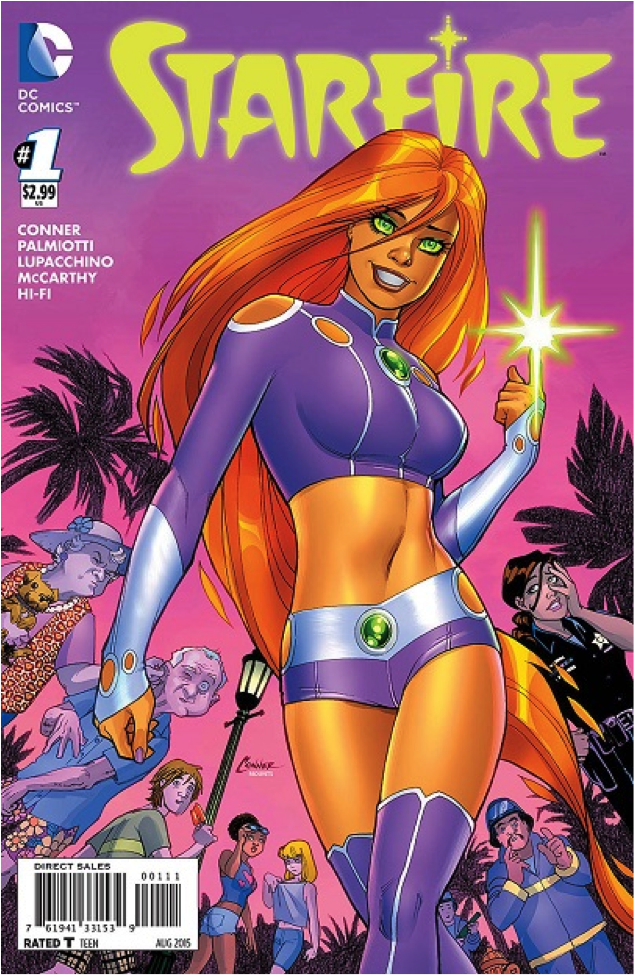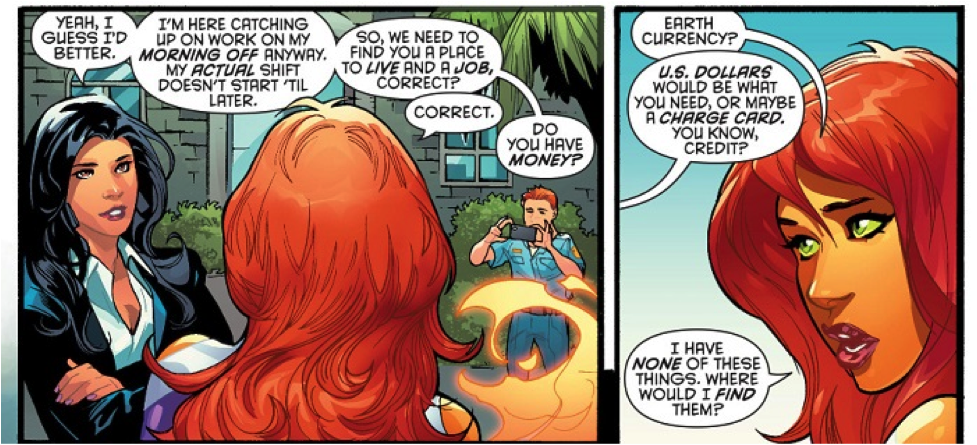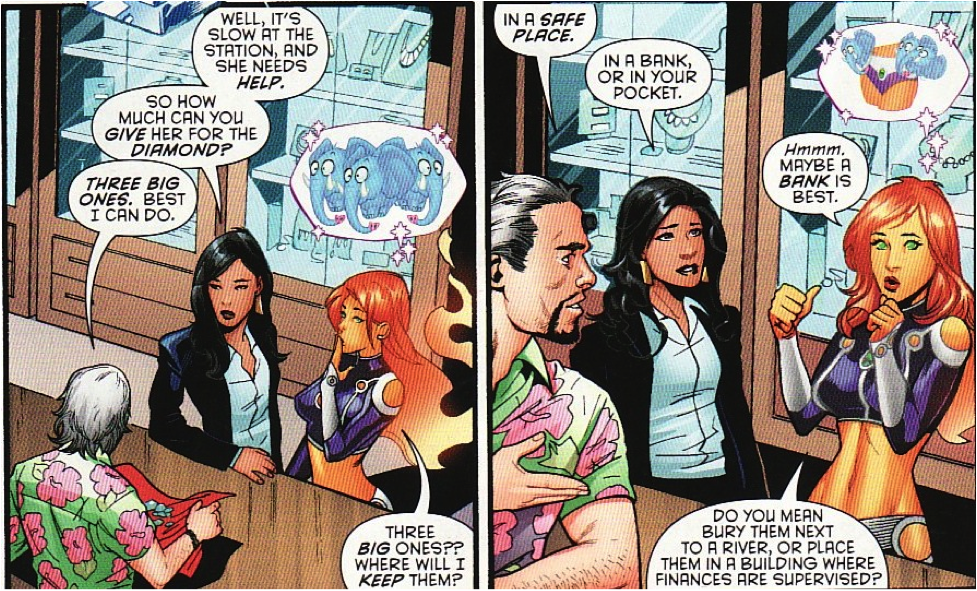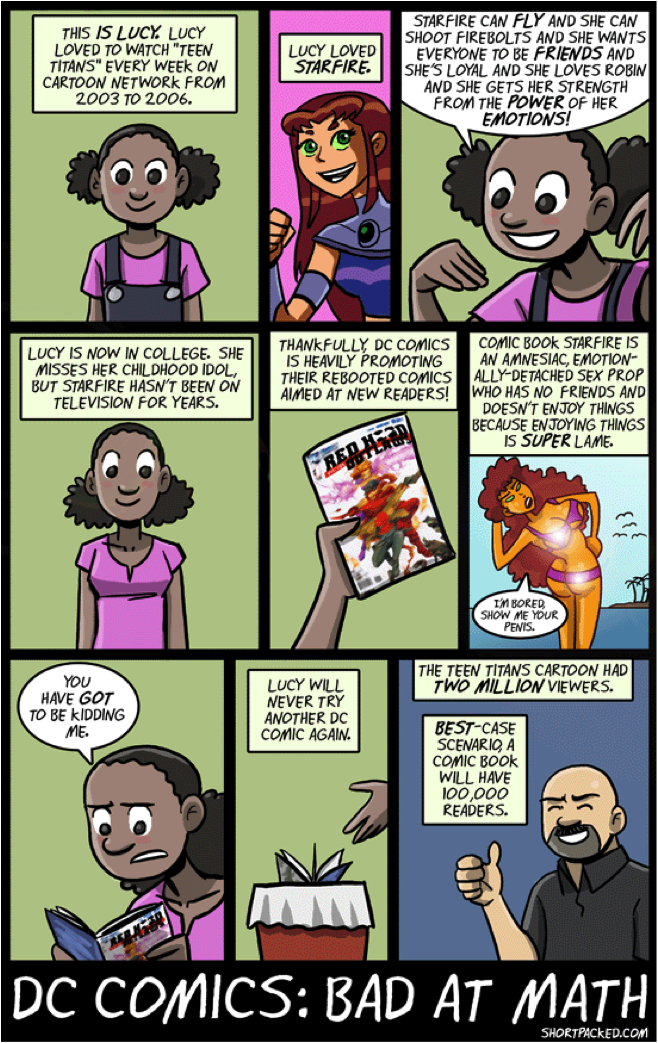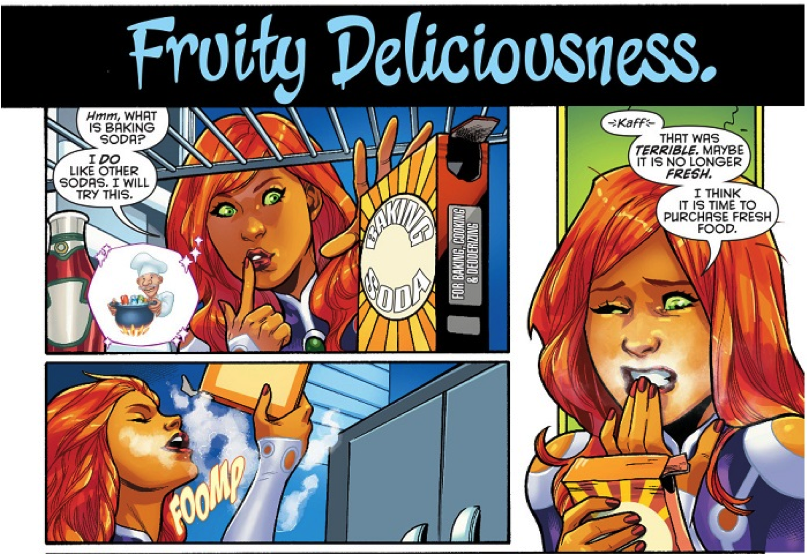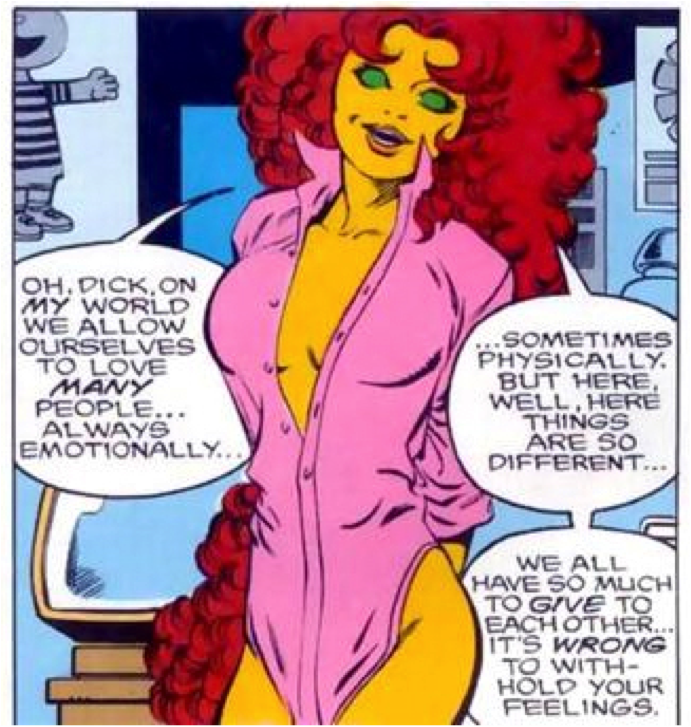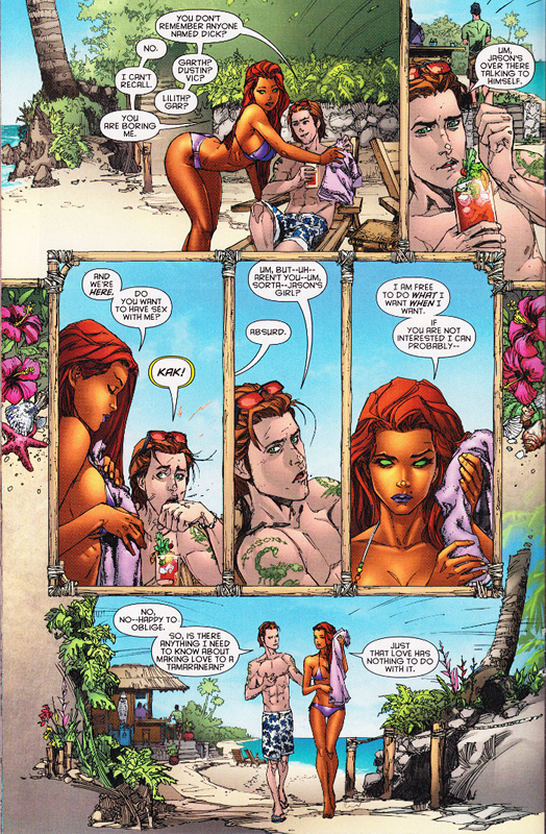A memorable scene from Community season 3’s episode “Regional Holiday Music” involves brainy overachiever Annie Edison (played by Alison Brie) indulging in a baby-doll styled performance of song and sex for Jeff Winger (Joel McHale). Donned in fishnets and high heels, Annie plays up the sex appeal of the childlike vamp, conflating an eagerness to be taught with sexual availability. The joke completes itself three times over when her song ends with the line “Boop be doop be doop doop sex!”, McHale’s visibly uncomfortable Jeff stating “Eventually you hit a point of diminishing returns on the sexiness.”, and Annie responding with a clump of incoherent babbling.
The point, quite clearly, is that the sex appeal traditionally found in female ignorance can evaporate quickly if over-exploited. It’s a scene I keep thinking back to when reading Amanda Conner and Jimmy Palmiotti’s current Starfire series. A revamp of the character made infamous in the title Red Hood and the Outlaws at the start of DC’s New 52 company lineup back in 2011, this version of Starfire is a narrative of an alien foreigner growing accustomed to ordinary human culture. As the series establishes its new setting of Key West, FL, it also presents the character of Starfire as ignorant to the point of idiocy. Her her mental state contradicts the level of reasoning and understanding she displaced in the years following the new 52. It’s ostensibly the same character trying to start fresh on Earth, yet concepts like currency, fruit and simple metaphors are completely new to her.
Beginning with the premise of the book, it’s easy to see why Conner and Palmiotti took this approach to the character. The blatant sex-object nature of her first appearance after the new 52 reboot was universally rejected. Starfire has a younger, larger and more female fanbase than many DC characters due to her appearances in the Teen Titans cartoon from 2003-2006. In that series, the character’s reaction to Earth customs (typically teenage Earth customs) was played up to be more wide-eyed and innocent than she ever actually was in the 1980s “New Teen Titans” comic where she first appeared. While the initial version by Marv Wolfman and George Perez had an intrigued and bemused fascination with human and American sensibilities, the cartoon version was decidedly more excitable and energetic. It’s a point made by an online fan comic that portrayed the cognitive dissonance between what new fans of the character enjoyed and what DC was presenting them with when showcasing her in Red Hood and the Outlaws.
The thing is, Starfire’s always been a problematic character. Interplanetary ignorance and alien sex appeal are both aspects of what makes her recognizable to fans of all kinds (the other being the warrior princess trope). Her character has historically championed free love, self-love and a refusal to stigmatize nudity, which is fine in and of itself. The problem is that she’s been depicted this way primarily by male writers, although not exclusively. Sex appeal was always a selling point of the “New Teen Titans” comic despite “teen” being in the title. George Perez flaunted both the male and female bodies in issues where the Titans take a day at a pool, spar and hone their fighting skills in a pool, battle to the point of ripped clothes and are generally sexualized in ways DC Comics character had yet to be seen up to that point in the mid-80s. Starfire was and still is generally remembered as the hot alien babe who took Robin the Boy Wonder’s virginity, and this is often played up in the fan discourse bleeding into the published work.
So in reinterpreting the character for the cartoon series, the producers used her fresh alien perspective and positive sense of self to present a character that eschewed negativity. She was less defined by the men and women around her and more by how she saw the world. In “Red Hood and the Outlaws” she was completely defined by how she was used to her male teammates advantage, at least initially (the public backlash to the first issue prompted a backing off on the sex toy aspect). Now in “Starfire”, the main recurring element is how everything she encounters is treated as a bewildering new experience for her.
It would be extremely easy to write Starfire off as untenable and suggest never featuring her in any type of presentation again, but I have to consider the potential audience for this type of character in a best case scenario. The Teen Titans animated series most certainly dumbed her down to a basic archetype, but it ended up being the least harmful. The original character of the 80s was the best of both the cartoon world and the New 52 world, being sexualized just as much as everyone else featured in the series. The only immediate problem is her relation to the men in her life, from being sold into slavery to being forced into a political marriage. Starfire would be best defined on her own in a solo title, so the solution for the current run is to not make her so unbelievably stupid. Degrees of naivety are aspects of her character, but too much of that clashes with common sense.
The central conflict is figuring out how to present a character who can embody several positive qualities without the objectifying narrative of the male gaze. Perhaps you can’t in the superhero genre, despite her book being written and illustrated by female creators, but a sense of relative intelligence shouldn’t be hard to include. There is nothing cute or appealing about a grown woman wandering around in a fog of ignorance in ways which defy logic. If Amanda Conner got rid of the foreigner aspect of the title, what else could she have to work with? Starfire could preach about acceptance of self, love of self and others and maintaining a positive outlook on life. This would undoubtedly clash with the genre the character exists in, but perhaps that’s the key. She doesn’t work well enough in the macho-fueled world of superheroes, so maybe she could be the first female alien Jesus Christ figure, preaching peace and love in ways which recall the original Wonder Woman. This would put her at odds with almost every single character she came across, but that’s the only reasonable solution to properly writing the type of person she generally is. The DCYOU marketing image for the Starfire title reads “She’s an alien warrior trying to find peace…and will fight anyone or anything to get it!”, which has nothing to do with the tone or direction of the book itself. If she however were to interact and present her views to the people of Earth and be put in a position to defend them, it would place her in the role of the protagonist that lends a sense of enlightenment as opposed to ignorance and removes the theme of the human way being the right way that is implicit whenever someone interacts with Starfire’s alien-sense of love and happiness.
I would very much like to see that character, but it doesn’t look like it will happen. For the forseeable future, as in the past, her creators don’t seem to be thinking very hard, and so Starfire is dumb.

